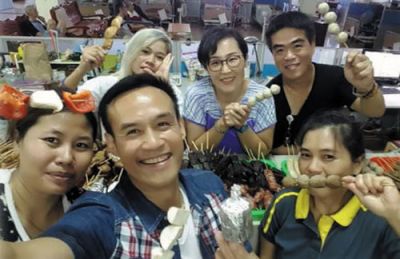
Freely Give
"What are you doing in Taiwan?," my friends would ask. "Oh, I work at the HIV/AIDS Center." "What? What did you say?" My friends were confused by my answer and couldn't understand what I said. After answering several times, they finally managed to understand. They didn't ask again because they didn't know anything about HIV or AIDS. It was just an unfamiliar word in their lives.
 I was once also like my friends. I often heard about the situation of people living with HIV/AIDS when I joined the Columban lay missionaries, but to me, these were people who had nothing in common with me and were not part of my life. I was basically indifferent about them. Last year, however, I had my first opportunity to meet patients living with HIV/AIDS. I visited them for three months and conversed with them. It was during this time that my own prejudices and preconceptions were challenged and shattered. Then one day, I got news that a young man with HIV/AIDS committed suicide which came as a huge shock to me. I was angry at myself and at society for the stigma and discrimination we show towards people living with HIV/AIDS. This incident has given me a deeper interest in those living with HIV/AIDS, and I started asking myself, the society and HIV/AIDS patients "why?"
I was once also like my friends. I often heard about the situation of people living with HIV/AIDS when I joined the Columban lay missionaries, but to me, these were people who had nothing in common with me and were not part of my life. I was basically indifferent about them. Last year, however, I had my first opportunity to meet patients living with HIV/AIDS. I visited them for three months and conversed with them. It was during this time that my own prejudices and preconceptions were challenged and shattered. Then one day, I got news that a young man with HIV/AIDS committed suicide which came as a huge shock to me. I was angry at myself and at society for the stigma and discrimination we show towards people living with HIV/AIDS. This incident has given me a deeper interest in those living with HIV/AIDS, and I started asking myself, the society and HIV/AIDS patients "why?"
There are 48 HIV/AIDS patients in the center where I work. We call them "residents." The center has beds in a large hall, and the residents live together on the first and second floors. Some of the residents have physical and mental disabilities because of complications. As a result, most find it very difficult to go out and always need someone's help. Very few family members or volunteers visit our center.
 It is not clear whether it is because of their loneliness or something else, but the residents have a strong obsession with food. The center prepares meals for them from donations we receive. Thanks to many donors, we also eat fruit, bread and cookies as snacks. But residents cannot always eat food, bread or fruit made from fresh ingredients. Residents generally don't like to talk about themselves and are especially reluctant to talk about their families. The residents know full well that their family doesn't want to live with them, and they worry that their families will be shunned by society. Therefore, the disease of the residents becomes a hidden secret.
It is not clear whether it is because of their loneliness or something else, but the residents have a strong obsession with food. The center prepares meals for them from donations we receive. Thanks to many donors, we also eat fruit, bread and cookies as snacks. But residents cannot always eat food, bread or fruit made from fresh ingredients. Residents generally don't like to talk about themselves and are especially reluctant to talk about their families. The residents know full well that their family doesn't want to live with them, and they worry that their families will be shunned by society. Therefore, the disease of the residents becomes a hidden secret.
Ironically, I realize how happy I am serving these people living with HIV/ AIDS. I live in Taiwan as a missionary, far from my family by my own choice. I do not see my family often, but I keep in touch with them all the time. Their encouragement and support is very important and helpful to me. Also, I can eat fresh food for my health and go wherever I want. I am grateful to have good neighbors and to be able to rest in my own private space. God has given me so much love and blessings in my everyday life.
I don't have the expertise or skills to help the residents in any major way. All I can do is sit and listen to them, because I know that this simple ordinary act is very special to them as it is not often that they have that experience. I feel sad that society, often out of fear, seldom thinks about the hurt and pain that people living with HIV/AIDS suffer. My hope is that people will see the "humanity" of those living with HIV/AIDS and not just the disease. And I also hope that people will be grateful and happy in the love they receive from God every day and share these gifts to people living with HIV/AIDS.
Columban lay missionary Lee Subin Matilda lives and works in Taiwan.